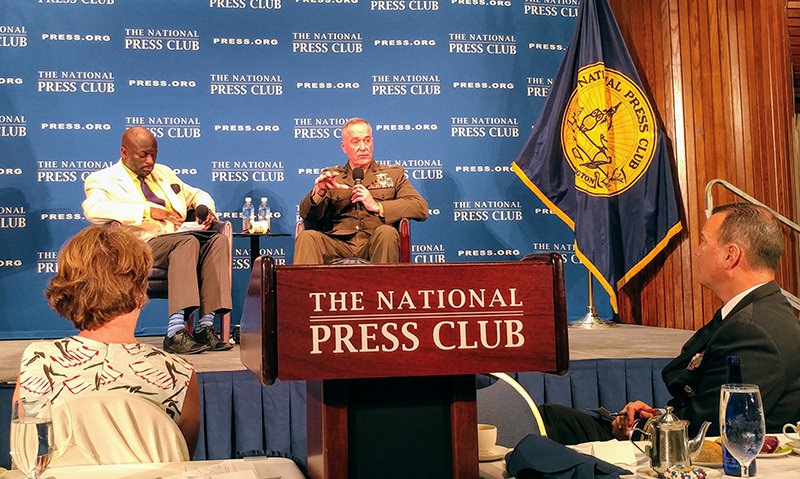
Legion attends historic luncheon at National Press Club
The National Press Club in Washington, D.C., held a luncheon June 19 with U.S. Marine Corps Gen. Joseph Dunford, chairman of the Joint Chiefs of Staff, to discuss a number of important issues facing the U.S. military.
Staff from The American Legion's Washington office gathered alongside more than 200 people inside the club’s ballroom for a question-and-answer session with Dunford, moderated by National Press Club President Jeff Ballou. Topics included the latest strategy for defeating the Islamic State and other terrorist groups, challenges from North Korea, cyber warfare, weapons acquisition and recruiting and strengthening U.S. alliances.
“We just had a very tense shoot down of a Syrian jet by U.S. forces and we had a very ominous statement from Russia that plays into the whole de-confliction agreement between the countries, essentially saying anything west of the Euphrates, we’re shooting down,” Ballou said as he began the session. “What is your reaction to that? Have there been any developments? Do you have any updates on where that stands? Is de-confliction gone?”
Dunford’s response was that the United States has worked very hard for the last eight months on de-confliction with the Russian Federation and pro-regime forces. The purpose was to make sure air crews were safe; personnel on the ground were safe; and that the U.S. could prosecute the Defeat ISIS campaign in Syria.
Dunford said the Russian Federation has indicated that their purpose in Syria, like that of the United States, is to defeat ISIS. “All of our operations in and around Iraq and southern Syria are designed specifically to get after ISIS and we (the United States, Russian Federation and pro-regime forces) have agreed in the past that operations that the coalition was conducting in Syria were effectively degrading ISIS’s capability. We’ll work to restore that de-confliction chain in the next few hours.”
When asked if he’s been in touch with a Russian counterpart, Dunford said he has not as of Monday morning. He has, however, met with the Russian counterpart twice this year and communicated another five or six times.
Deployment of additional forces in Afghanistan. Dunford said no decision has been made with regard to sending an additional 4,000 troops to Afghanistan. In terms of forces on the ground, the president did choose to delegate that decision to Department of Defense Secretary James Mattis, he said.
“This is what is important and probably has been under reported,” Dunford said. “Secretary Mattis’s decision about additional forces in Afghanistan will be made in the context of a broader strategy review for South Asia that is ongoing, and is expected to report back probably sometime in the middle of July. So, it won’t be just about Afghanistan. There are a number of interdependent variables that bear on the problem inside of Afghanistan across the region.”
Military strategy for Afghanistan ready by mid-July. Dunford and Mattis had an opportunity to appear before the Senate Armed Services Committee June 13. When Committee Chairman Sen. John McCain asked about whether or not there is a strategy for Afghanistan, Dunford stated that, “Mattis said that number one, we agree that Afghanistan is not where we want it to be and we have spent the last couple of months discussing where it might go in the future. And he, as I will today, indicated to chairman McCain that sometime in the middle of July, we would have that strategic review complete.”
Dunford said he and Mattis will consult with McCain and the other members of Congress “as the coming weeks go on.”
Violent extremism/defeating transnational terrorism. Dunford said the tragic loss of life associated with violent extremism is a big issue. “I think the military dimension of that particular problem is working with local partners to create the conditions where people can be safe at home and don’t have the need to go and become refugees,” he said. “Obviously, (we can provide) some immediate support in the form of water, supplies and food, and making sure that the conditions are conducive to nongovernmental organizations.”
In addition, Dunford said violent extremism is not over with the ISIS defeat. That’s why it’s important to get as many countries as possible to cooperate in:
• intelligence sharing;
• information sharing;
• effective action;
• limiting the freedom of movement of foreign fighters;
• limiting their ability to share resources; and
• eroding the effectiveness of their narrative.
“I think we should all be braced for a long fight, and that’s why we emphasize making sure that we have the broadest network possible of partners to help deal with this challenge,” he said. “These are extraordinarily complex, if not wicked, problems we’re dealing with. Beware of those with too much confidence that they have all the answers.”
Read Dunford’s full remarks here. Click here for a video of the luncheon.
